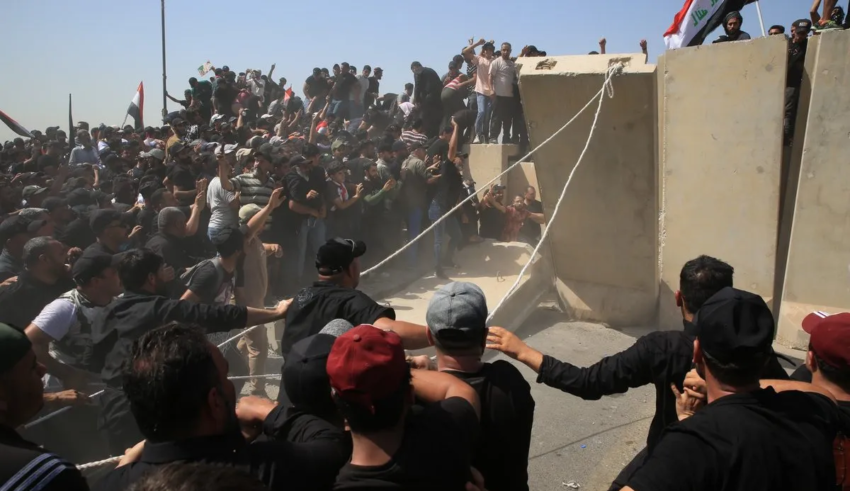
In a worrying but strangely unsurprising turn of events, the last weeks of August and the beginning of September have seen the explosion of a major political crisis and violent clashes in Iraq. The breakdown of the Parliament and the subsequent taking to the streets of supporters of the different prominent figures of the Iraqi political scene was predictable: the inability of leaders to form a government following the elections held in October 2021 was just the last of a long series of historical developments that set the scene for instability to flourish in the country for decades.
The current crisis, in fact, can be seen as being born out of the long-standing internal rivalry among different factions of the Iraqi Shi’a community, favoured by the turbulent events that have shaken Iraq since the 1908s.
After winning the majority of the seats in Parliament during last year’s elections, nationalist leader Muqtada al-Sadr had hoped to form a government of national unity, momentarily putting aside ethno-religious differences and joining forces with Sunni and Kurdish parties. Al-Sadr’s Iran-backed opponents, however, claimed that the elections had been fraudulent and tampered with by the United States; the so-called Coordination Framework was thus able to stop al-Sadr from concretising his political plan by boycotting the constitutionally required election of a President before a government can be designated. By simply refusing to attend parliamentary sessions, exponents of the Coordination Framework launched the country into a 9-month impasse, which began to escalate towards violence when al-Sadr announced his retirement from the political scene and ordered his party to resign en-masse in June. Clashes erupted when al-Sadr’s supporters stormed the Iraqi Parliament in hundreds to protest the nomination of Mohammed Shia al-Sudani for prime minister by the filo-Iranian coalition, openly rejected by al-Sadr.
Such opposition, yet, should not be taken as a mere personal rivalry between the two political figures; rather, it is representative of al-Sadr’s dissatisfaction with the Iraqi political system as a whole, as well as a mirror of the internal differences and pre-existing tensions between al-Sadr and the Iran-backed Shi’a Coordination Framework, influencing the entire Iraqi Shi’a people.
In July, in fact, leaked audios showed former Prime Minister Nouri al-Maliki, leader of the Coordination Framework, warning that the country might be on the brink of a “devastating war from which no one will emerge unscathed, unless the project of Moqtada Al-Sadr, Massoud Barzani and Muhammad Al-Halbousi is defeated.” Al-Maliki enjoys the support not only of the CF, but also of militant groups known as Hashd al-Shaabi (“The Popular Mobilisation Forces”), funded and armed by both Iraq and Iran to fight the Islamic State. Following the formal defeat of ISIS/ISIL, however, which left Iraq deeply wounded and with little chance of making a swift recovery, the militias continued to enjoy the ideological and financial support of Teheran. They thus helped to maintain the well-established Iranian influence in the neighbouring country, which was particularly favoured by the vacuum left by the retreat of the United States from Iraq in 2011; Iran’s leverage and the presence of politically-oriented, violent militants strongly contributed to ensuring that Iraq would not be able to recover from the continuous drainage of its resources, manpower, and political stability which can be traced all the way back to the Iran-Iraq war in the 80s, and the following decades of explosive violence throughout the Middle East.
The current Iraqi political crisis is therefore not a new phaenomenon, nor should it be seen as only an internal issue for Iraq; rather, it should emerge as a symptom of the damage brought to the region by the incessant insecurity and conflict that followed the establishment and dissolution of the West-imposed mandate system. Particularly, it is high time to put an end to the general rhetoric that the Middle East is inherently unstable and prone to war; the conditions for such events are not caused by “ill fate,” but have been progressively crafted in the past century. Now, looking at Iraq bring us to the task of facing an unprecedented feud between Iraq’s Shi’a groups which, once set in motion, will not be ended by a simple retreat of al-Sadr or of the Coordination Framework; the roots of the conflict run deep, as will its consequences for the entire region and world if long-term reform, peace-making, and state-building are not initiated with the support of the international community.
References
https://www.facebook.com/middleeastmonitor. (2022, July 20). Iraq: latest leak of recording by former PM sparks more outrage. Retrieved from Middle East Monitor website: https://www.middleeastmonitor.com/20220720-iraq-latest-leak-of-recording-by-former-pm-sparks-more-outrage/
Ibrahim, A. (2022, August 31). Muqtada al-Sadr and Iraq’s propensity for an intra-Shia conflict. Retrieved from Aljazeera.com website: https://www.aljazeera.com/news/2022/8/31/muqtada-al-sadr-and-iraqs-propensity-for-a-shia-shia-war
Lu, C. (2022, August 30). Inside Iraq’s Political Crisis. Retrieved from Foreign Policy website: https://foreignpolicy.com/2022/08/30/iraq-politics-moqtada-al-sadr-protest-election/
By The European Institute for International Law and International Relations.















